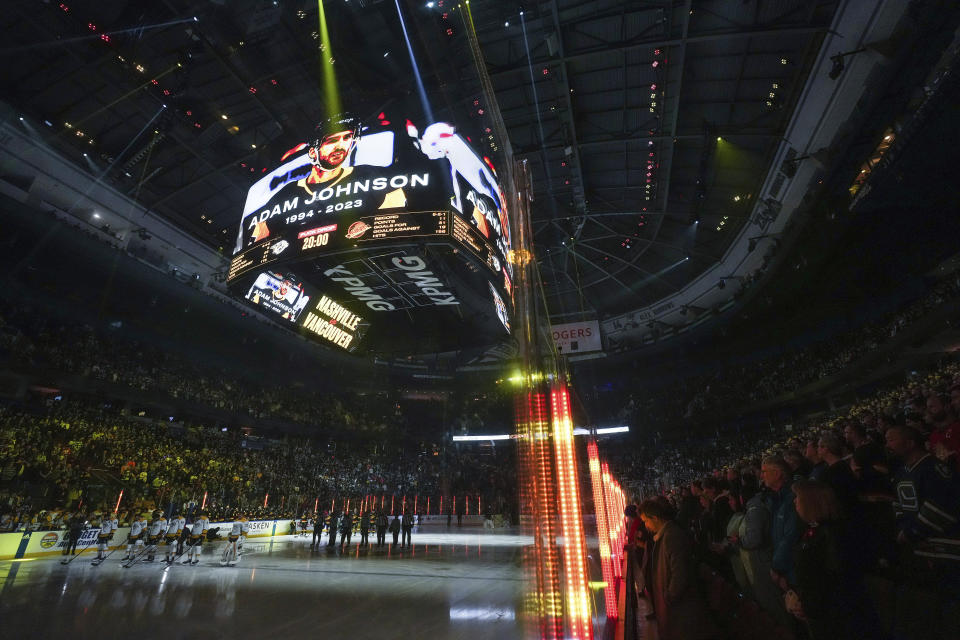Player's death from a skate cut to the neck in England leads to more NHL talks on cut protection
EAST RUTHERFORD, N.J. (AP) — The death of American hockey player Adam Johnson from a skate blade to the neck in a game in England is leading to further discussions about cut-resistant protection in the NHL and other leagues.
Commissioner Gary Bettman and Players' Association executive director Marty Walsh touched based Sunday in the immediate aftermath of the death to set up further talks between the league and union. For several years the two sides have been studying skate cut injuries and how to reduce and avoid them, and now the topic has taken on greater urgency at various levels of the sport.
"We’re going to explore everything," Walsh said Wednesday. "We have to continue to have conversations on this as we move forward here. It’s a change for the players, but it’s also about protecting them, so I think we will have those conversations as we move forward here.”
Johnson, a 29-year-old from Minnesota, died at a hospital after being cut in the neck by the skate blade of an opponent during a game Saturday night in the Elite Ice Hockey League. The league called it a “freak accident,” and South Yorkshire Police have said they are investigating.
The incident already has had an impact across the Atlantic Ocean, with the American Hockey League and ECHL affiliates of the Pittsburgh Penguins, the organization Johnson once played for, mandating neck guards for players. The AHL and ECHL mandated cut-resistant wrist and foot/ankle protection last summer, in consultation with the Professional Hockey Players' Association.
“We’ve seen it with other things, particularly with visors: If the players get used to it in the AHL, then they’re going to want to continue to use it in the NHL, so that’s the theory with the wrist guards and the foot socks that it’s something new and the players have to get used to it,” AHL president and CEO Scott Howson told The Associated Press by phone Tuesday. “Given what’s happened over the weekend with Adam Johnson, we are working with the NHL to figure out what the next step is in term of neck guards.”
The English Ice Hockey Association announced it would mandate neck guards beginning Jan. 1, 2024, citing possible supply issues. T.J. Oshie of the NHL's Washington Capitals said the apparel and equipment company he co-owns already has run out of its entire supply of cut-resistant neck protection.
No such mandate currently exists in the NHL, though many players have added Kevlar or other protective material in the decade since five-time All-Star Erik Karlsson suffered a torn Achilles tendon from a skate cut. Evander Kane missed more than two months last season after his left wrist was cut by a skate blade.
Such injuries have made skate cuts a matter of great importance for several years.
“It’s been on the burner," Bettman said. "It’s something that we’ve been looking at in terms of cuts to the wrist, cuts to the leg — and worse — and it’s something we’re going to continue to discuss and continue to study.”
Walsh said skate blade safety was a fresh issue when he met with one team Sunday night and that players have reached out to members of his staff to discuss it. The same goes with minor league players who belong to the PHPA, many of whose opinions have changed rapidly since Johnson's death.
“The topic’s now front and center in the team meetings — the players bring it up,” PHPA executive director Larry Landon told the AP by phone Wednesday. “Our guys are asking for them. Some guys are asking for neck guards. A lot of guys who knew Adam want neck guards out of respect for him, and we’ll see where it goes in the weeks ahead.”
Although the desire to try out protective gear has increased, there's no sense yet that the NHL and players in the top hockey league in the world are rushing to make neck guards mandatory. Walsh expects discussions with players and the league office to continue, much as they did with visors and, decades earlier, helmets.
“We don’t impose equipment changes without the agreement of the players’ association," Bettman said. "This has always been a collaborative effort, and together we’ve been studying cut-resistant materials and the injuries that occur from skate blades over the last few years. This is not something new for us to focus on.”
___
AP NHL: https://apnews.com/hub/NHL

 Yahoo Sport
Yahoo Sport 







































































